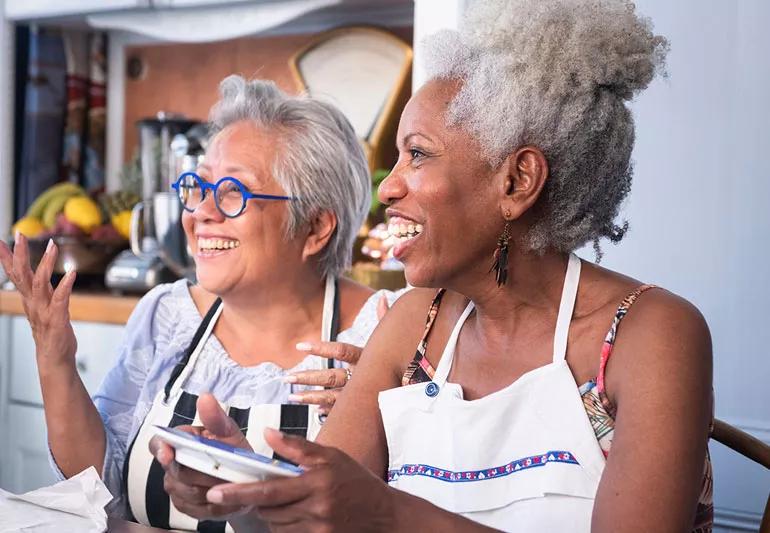You might be protected, but you still need to be careful

Image content: This image is available to view online.
View image online (https://assets.clevelandclinic.org/transform/cbe38b18-bc91-461a-919e-ab60c434ada2/elderFriendsLaugh-1159578081-770x533-1_jpg)
Elder friend laugh while crafting
You got the call or online confirmation, you showed up for your appointment or appointments and now, you’re fully vaccinated.
Advertisement
Cleveland Clinic is a non-profit academic medical center. Advertising on our site helps support our mission. We do not endorse non-Cleveland Clinic products or services. Policy
That is truly wonderful.
But before you start kissing babies, hugging strangers or throwing all of your masks away, we’re here to tell you that you still need to be careful since there are still a lot of unknowns swirling around us.
So what can you do once you’re considered “fully vaccinated?” Infectious disease specialist, Kristin Englund, MD, offers some words of hope and tips for staying safe as you continue to navigate through life during a pandemic.
According to the CDC, you’re not considered fully vaccinated until it’s been at least two weeks since your second dose of a two-dose series like Pfizer’s or Moderna’s vaccine, or it’s been two weeks since you received a single-dose vaccine like Johnson & Johnson’s.
The CDC stresses that if it’s been less than two weeks since you received a single-dose vaccine or you haven’t received your second dose in the series, you are NOT fully protected. That means you still need to take all of the necessary precautions like wearing a mask, washing your hands and avoiding large crowds.
When you get the vaccine, it enters your body and helps your immune system learn how to recognize and fight the virus that causes COVID-19. You’re not getting the live virus when you’re vaccinated. The COVID-19 vaccines that have been approved for emergency use simply teach our bodies to protect us from future infection.
Advertisement
It can take about two weeks after vaccination for your body to build up immunity against the virus that causes COVID-19. Because of this, it’s possible to contract COVID-19 before or just after vaccination and then get sick because the vaccine didn’t have enough time to work as intended.
So, what can fully vaccinated people do?
The CDC has said that fully vaccinated people can travel. Here are their current recommendations.
If you’re fully vaccinated, you don’t have to quarantine after being exposed to COVID-19 unless you start experiencing symptoms. If you start experiencing symptoms, this could mean that the vaccine is not effective or you were exposed to a variant.
However, if you’ve been in close contact with someone who has COVID-19 or you are experiencing symptoms, get tested. You should get tested five to seven days after exposure regardless of whether you have symptoms or not. The CDC also suggests:
Dr. Englund stresses that even though you’re fully vaccinated, you’re not superhuman. You still need to wear your mask in group settings to protect yourself from the many unknowns, including new variants.
“When you’re going out into public, just because you’re fully vaccinated doesn’t mean that you’re completely safe. You’re going to be interacting with a lot of different people at grocery stores, sporting events and in other public spaces. So, you’ll absolutely need to continue to wear your masks in those settings.”
Advertisement
The guidelines have pretty much remained in place if you’re going out into public. They’re the same for healthcare settings, too.
Dr. Englund says it’s important to continue to wear our masks and face shields. “It’s crucial, especially when we don’t know if people are fully vaccinated. And as you enter a hospital or healthcare provider’s office, you don’t know the health status of the person who might be walking or sitting next to you. That person could be at high risk of getting COVID-19. So, we certainly don’t want to put people in healthcare settings at risk.”
Recent studies have shown that protection against the virus, and the ability to prevent infection with variants, can decrease over time after vaccination. The CDC says with the recent emergence of the omicron variant, vaccination, boosters and prevention efforts are very much needed to protect us from COVID-19. So if you think two doses of a vaccine are good enough, think again. Don’t skip your COVID-19 booster.
According to the CDC, clinical trials showed that a booster shot increased the immune response in trial participants who finished a Pfizer-BioNTech or Moderna two-dose series six months earlier or a J&J/Janssen single-dose vaccine two months prior. This increased immune response could mean improved protection against getting infected with COVID-19, including the delta variant. For Pfizer-BioNTech and J&J/Janssen, clinical trials also showed that a booster shot helped prevent COVID-19 with symptoms.
Advertisement

Sign up for our Health Essentials emails for expert guidance on nutrition, fitness, sleep, skin care and more.
Learn more about our editorial process.
Advertisement
The latest vaccine offers the most up-to-date protection
Irregularities in cycle length and flow aren’t a cause for concern
Before you panic, here are the options to consider
Get the facts before assuming the worst
It's not scary and it's another tool that can help us fight the coronavirus
An expert gives insight on what to do if you miss that second appointment
The short answer from a primary care specialist
The short answer from an infectious disease specialist
Type 2 diabetes isn’t inevitable with these dietary changes
Applying a hot or cold compress can help with pain
Pump up your iron intake with foods like tuna, tofu and turkey